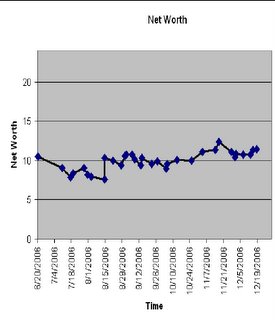I got paid today!!! CELEBRATE!!!
Ok, now that I've had my fun, it is time to show a breakdown of my paycheck.
I get paid X/hr...I work 40 hours/wk...my paycheck = 40* X = 40X
Wow ,that was easy!
If Visa, Master Card, American Express, USAA, Wachovia, Bank of Amaerica, and roughly 10,000 other banking institutions in the US of A didn't exist...calculating my paycheck amount sure would be easy. PS: Don't forget that big bully Uncle Sam...That guy has been beating me up for my lunch money since the first jon I got when I was 15.
So now the real breakdown.
My '40X' paycheck is representative of 86.47% of my income before any tax/pretax deductions.
First...I'll run through my pre-tax deductions. (all actual amounts are bi-weekly so I took the liberty of calculating the monthly payments)
Pre-Tax Deductions
Medical Plan: 0.5% of my income (not bad...if something bad happens...I'm taken care of)
Dental: 0.12% of income (needs my teeth)
Life Insurance: 0.04% of my income (100% of my annual salary goes to my brother if I
die...Bro,please don't get any ideas...they don't pay me that much anyhow.)
Long Term Disability: 0.45% of my income
401IK: 9.51% of my income (this is more than likely one of the best decisions that I've ever
made...it was also really esay...the best ideas are easy...but it it the
slightly more difficult ideas that really help you in the long run )
Vision: 0.10% (also a great investment...the annual cost of this is only 1.23% of one months
income but it ends up saving me roughly 10% of one months income if I get one
new pair of glasses and contacts each year)
TOTAL PRE-TAX DEDUCTIONS: 10.72% of my monthly income
Salary income left to account for 73%
Relative amount of income left to account for:75.50%
Tax Time!
Tax deductions:
Federal Income Tax: 7.14% (he takes almost as much as I save for retirement...gee, thanks)
Social Security: 5.29% (and of course...I'll never see any of that again)
Federal Medicare: 1.24% (can't say much about that...I support giving medicine to the sick)
VA Income Tax: 3.45% (could be worse...California charges 7.25% income tax!...then again..All
states except Alaska, Delaware, Montana, New Hampshire and Oregon,
collect sales taxes.
http://www.retirementliving.com/RLtaxes.html )
TOTAL TAXES: 17.12% of income
So, I had 86.47% of my relative income before any tax/pretax deductions.
Income: 86.47%
Pre-tax deductions: 10.72%
Taxes: 17.12%
Remaining Income: 72.16%
Percent of Paycheck remaining: 58.63%
Not too shabby!
I am somewhat frustrated with the fact that the Government seems to be getting more money than I save for retirement...I plan on upping my 401K contribution at the end of the year when I perform my annual review of my retirment investments. (this should occur Wednesday)
In case I don't post again today. (likely that I will)
I hope everyone has a GREAT WEEKEND AND A HAPPY NEW YEAR!
Until next time,
THOR



